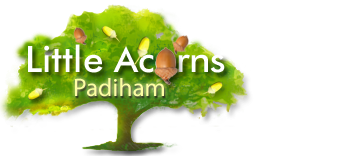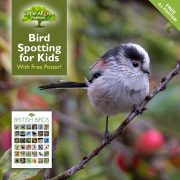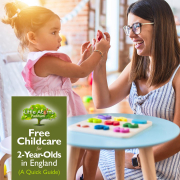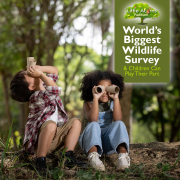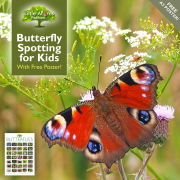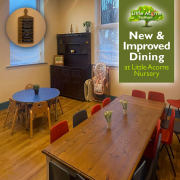20 Benefits of Nature to Children
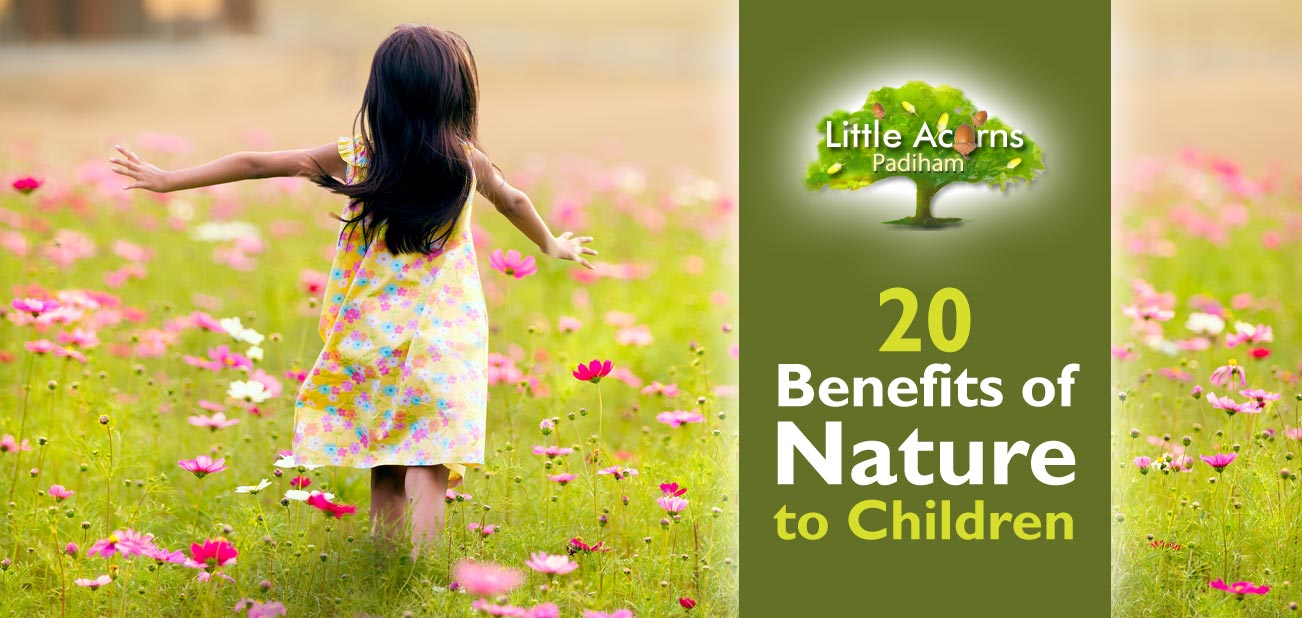
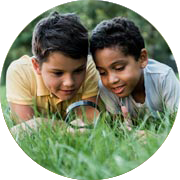 One of the many reasons we love nature and nature-based children’s activities here at Little Acorns Nursery is that nature is incredibly beneficial to children. What’s more, the benefits start right from their earliest years and are profoundly powerful to little ones. There have been many studies about this over the years and they all seem to conclude that nature is incredibly good for us all, especially so during the early years. Today’s post looks at 20 of the key benefits that spending time in and around nature holds for children and, with Spring now upon us, it’s the perfect time to begin getting little ones outside more, weather permitting.
One of the many reasons we love nature and nature-based children’s activities here at Little Acorns Nursery is that nature is incredibly beneficial to children. What’s more, the benefits start right from their earliest years and are profoundly powerful to little ones. There have been many studies about this over the years and they all seem to conclude that nature is incredibly good for us all, especially so during the early years. Today’s post looks at 20 of the key benefits that spending time in and around nature holds for children and, with Spring now upon us, it’s the perfect time to begin getting little ones outside more, weather permitting.
1. Nature Stimulates Imaginations & Creativity
The natural world is an amazing and multi-faceted place, brim-full of wonder and fascinating flora, fauna, landscapes and terrains. As such, it’s a place where children will naturally play, build, create, invent and imagine. Young imaginations can simply explode with creative ideas; such is the range of possibilities that are available to children who spend time out in nature.
2. Nature is Good for the Body
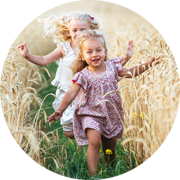 Spending time in and around nature means children are more likely to be active, for example, walking, running, skipping, climbing, playing, making, or simply building a den. Such activities will not only help them hone fine and gross motor skills, but will also improve coordination, balance, and fitness. Those skills will help them day-to-day while expending energy in this way will help them maintain a healthy weight and body-mass index.
Spending time in and around nature means children are more likely to be active, for example, walking, running, skipping, climbing, playing, making, or simply building a den. Such activities will not only help them hone fine and gross motor skills, but will also improve coordination, balance, and fitness. Those skills will help them day-to-day while expending energy in this way will help them maintain a healthy weight and body-mass index.
3. Nature is Good for the Mind & Spirit
When the world is getting on top of you, time spent in or around nature is sure to be a great antidote, even for children. Spending time in nature is known to reduce stress, relieve depression, lower anxiety levels and naturally give people, including children, a greater feeling of well-being.
4. Nature Gives Children Freedom
 One of the more obvious benefits of nature is that it gives children a huge sense of freedom that they might not otherwise experience. Being in The Great Outdoors allows children, under appropriate supervision, to run, explore, and play in ways that are far more free than in any other situation. This will also give them a huge sense of natural joy.
One of the more obvious benefits of nature is that it gives children a huge sense of freedom that they might not otherwise experience. Being in The Great Outdoors allows children, under appropriate supervision, to run, explore, and play in ways that are far more free than in any other situation. This will also give them a huge sense of natural joy.
5. Nature Facilitates Discovery
Time spent close to nature aids natural discovery too and that’s never more important than in children’s formative years. Out in the natural world, there are a myriad of amazing things to discover, whether they’re flowers, trees, blossoms, insects, minibeasts, animals, birds, or seasons. Even rocks can be fascinating! Discovering new things first-hand is a perfect way for children to learn more about the natural world around them — and their place within it.
6. Nature Promotes Profound Thinking
All this discovery and freedom will spark natural questions in the minds of children. What does this do?” … “Why does it look and behave like it does?” … “How did it get here?” Indeed, “How did I get here?”. Nature encourages children to think about the world in new, profound ways. Such questions are a healthy part of every childhood; they help children learn, and may even lead to careers in such things as science, medicine, or research.
7. Nature is a Feast for the Senses
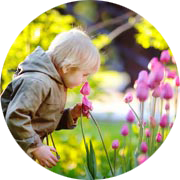 The stimulation of the senses is never more important than during children’s early years and spending time in nature is the perfect vehicle through which to do so. With so many colours, sounds, smells, textures and even (under adult supervision) tastes available in the natural world, it is indeed a feast for children’s senses. Through the senses, children will learn more about the world and generate millions of new connections in their developing brains. It’s almost magical!
The stimulation of the senses is never more important than during children’s early years and spending time in nature is the perfect vehicle through which to do so. With so many colours, sounds, smells, textures and even (under adult supervision) tastes available in the natural world, it is indeed a feast for children’s senses. Through the senses, children will learn more about the world and generate millions of new connections in their developing brains. It’s almost magical!
8. Nature Fosters a Sense of Responsibility
When a child is tasked with feeding animals or tending to growing seeds and plants, they will naturally gain a sense of responsibility. After all, feeding and watering flora and fauna is literally a matter of life and death when you think about it. So, allowing children to become more responsible and to look after someone or something else is one of life’s most valuable and important lessons.
9. Nature Promotes Empathy
Nature can also promote feelings of empathy in children. That’s another key trait for children to nurture, and nature will help them achieve it. Whether they’re looking after a plant, feeding a bird or animal, or simply observing them, such activities will help many to put themselves in another living thing’s shoes. Fostering greater empathy is a great skill to develop and will stand children in good stead into adulthood.
10. Nature Fosters Environmental Consciousness
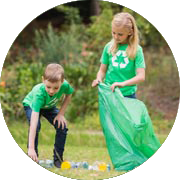 Being around nature regularly can also help children lean naturally towards environmental issues, learn about the problems and become part of the solution. An appreciation of nature is indeed the first step towards becoming environmentally conscious and proactive. That’s a great thing for the planet, particularly as today’s children will become tomorrow’s custodians of the Earth.
Being around nature regularly can also help children lean naturally towards environmental issues, learn about the problems and become part of the solution. An appreciation of nature is indeed the first step towards becoming environmentally conscious and proactive. That’s a great thing for the planet, particularly as today’s children will become tomorrow’s custodians of the Earth.
11. Nature Gives a Sense of Perspective
Nature is also a great leveller. When issues are troubling children at home or day-to-day, spending a little time in nature, surrounded by beautiful trees, flowers, wildlife and landscapes, will help to put things into perspective. Sometimes seeing the bigger picture can help children see the little things for what they really are. That’s a healthy thing too.
12. Nature Helps Children Academically
Studies over recent decades have shown that, if children spend time in and around nature, they perform better academically. Findings include improved reading, writing, mathematics and even better test results.
13. Nature Improves Concentration in the Classroom
Part of the above may be to do with improved concentration following time spent in and around nature. For example, children coming in from a break in the park or the setting’s garden are shown to have greater focus, i.e. improved concentration once they return. It’s almost as if nature recharged them! Even a simple view of nature from the classroom window has been shown to help children’s performance in the classroom — which is incredible when you think about it.
14. Nature Supports the EYFS Goals
A key part of the education of children under five is the Early Years Foundation Stage (EYFS). This is an important framework that prescribes the format, content and approach that will benefit children significantly during their early years learning and development. A set of EYFS ‘goals’ is part of that and spending time around nature helps children achieve many of those goals, particularly with respect to understanding the world, physical development, communication and language, and personal, social and emotional development. We’ll follow up with more information about the EYFS in a separate guide in due course.
15. Time Spent in Nature Improves Sleep Quality
Studies also show that spending time out in nature helps children to sleep more deeply. Sleep, particularly deep sleep, is immensely good for children and adults alike, so that’s hugely important and will help young minds and bodies to recharge and refresh.
16. Nature Promotes a Healthier Lifestyle
Spending all this time outdoors, and it being so interesting and a lot of fun, means it’s more likely that children will have an interest in nature and outdoor life when they’re older. That’s healthy for them in all the ways described in this article, and can therefore only enrich their lives and encourage healthier lifestyles into adulthood.
17. Nature Enhances Social Skills
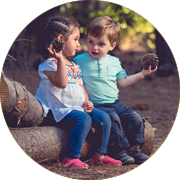 Children generally team up with friends when they’re playing and exploring outdoors. Spending time playing together in natural environments fosters many different kinds of interaction. This can boost confidence, language, communication and social skills. Stronger bonds and a deeper understanding of peers are likely to form from this.
Children generally team up with friends when they’re playing and exploring outdoors. Spending time playing together in natural environments fosters many different kinds of interaction. This can boost confidence, language, communication and social skills. Stronger bonds and a deeper understanding of peers are likely to form from this.
18. Nature Helps Children Build Additional Skills
Playing, learning, creating and discovering with friends in natural environments will present both opportunities and challenges. These are great for the development of skills like teamwork, cooperation, leadership, problem-solving, critical thinking, the assessment of risk and more. Such skills will be useful throughout children’s lives.
19. Time Spent in Nature Opens Up Possibilities
When children spend time around nature, all kinds of possibilities open up to them. These include the chance for discovery, learning, adventure, invention, hobbies and even careers that are in some way linked to or influenced by childhood exposure to nature. Conservationists, zookeepers, wildlife photographers, travel writers, explorers and even some TV presenters ended up doing their jobs because they connected to nature from an early age.
20. Spending Time Around Nature is Great Fun!
We should not forget one hugely important aspect of nature — spending time around it in childhood is huge fun! The natural world opens up endless opportunities, adventures, new places, discoveries and new ways for children to be entertained. It’s no wonder that children love being outdoors so much — the joy is clear to see on their faces whenever they spend time in The Great Outdoors.
With all that in mind, the overall message is to give children safe access to nature as often as possible — it’s incredibly good for them and nature teaches them so much.
Nature at Little Acorns Nursery, Padiham
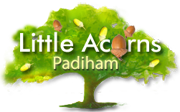 At Little Acorns Nursery in Padiham, we know just how important nature is to children. That’s why the nursery has its beautiful garden, a wild zone, a mud kitchen and a planting area where children can get hands-on with nature. We often adapt such areas to suit particular learning activities that children are focusing on at specific times of the year.
At Little Acorns Nursery in Padiham, we know just how important nature is to children. That’s why the nursery has its beautiful garden, a wild zone, a mud kitchen and a planting area where children can get hands-on with nature. We often adapt such areas to suit particular learning activities that children are focusing on at specific times of the year.
To enquire about a place for your child at Little Acorns Nursery, please get in touch using one of the following options:
Our high-quality nursery/preschool in Padiham is also conveniently located for those nearby who require a childcare nursery near Hapton, Rose Grove, Burnley, Altham, Huncoat, Read, Simonstone, Sabden, Higham and Wood End.
